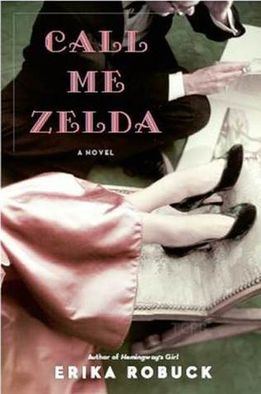 Written by Lauryn Smith In addition to being F. Scott Fitzgerald’s muse, Zelda Fitzgerald has inspired writers like Therese Anne Fowler ("Z: A Novel of Zelda Fitzgerald"), Sally Cline ("Zelda Fitzgerald: Her Voice in Paradise"), R. Clifton Spargo ("Beautiful Fools: The Last Affair of Zelda and Scott Fitzgerald"), Nancy Milford ("Zelda: A Biography") and Erika Robuck, author of "Call Me Zelda." Why did Zelda garner nearly as much posthumous acclaim as her literary husband? There are a number of reasons, both glamorous and not-so-glamorous, some of which are uncovered in Robuck’s novel. Robuck's fiction, based on Zelda’s real life, demonstrates how Zelda was artistic in her own right (she was a ballerina, painter and writer), and how at times her mental well-being suffered from the effects of an overtly opulent lifestyle and a struggling marriage. "Call Me Zelda" focuses on the story of the fictionalized Anna Howard, a psychiatric nurse at the Phipps Clinic in Maryland who cares for and becomes enraptured by Zelda. In the book, Robuck illustrates Anna’s past and present and how Anna attempts to reconcile the two through her blossoming friendship with Zelda. While syntactically well-written, the content of Robuck’s novel, which is clearly geared toward women readers, might come off better if read prior to some of the aforementioned books. What differentiates Robuck’s story and makes it worth the read is that rather than being another tale strictly about or from a Fitzgerald, it is told from an outside perspective, specifically Anna’s. Still, one would expect more about the novel’s namesake than is presented.
The narrator is quite idealized, lending for questionable validity. Plus, reading "Call Me Zelda" after Fowler's "Z," like this Reviewer did, lends for a good amount of skepticism about the historical accuracy of Zelda’s relationships and overall believability (read "Z" and you will understand why). Of note is that while the story is set in the 1930s, there is little to no reference or detail relating to the period. Robuck would have been better off adding some description of setting and context instead of focusing her efforts on the pseudo-mystery involving Anna's search for Zelda’s missing diaries, an unconvincing attempt at a resolution between Anna and Zelda when their friendship hiccups, chosen as a banal cure for Zelda’s mental state. Anna’s character is the epitome of selflessness, almost frustratingly so. Her saddened outlook following the loss of her family invokes her to focus much of her attention on Zelda and maybe even “fix” Zelda and her relationship with Scott. Though a seemingly positive action, her conviction is presumptuous in hindsight, which is irksome because the tale then becomes an insultingly simple reflection of the real Zelda and the roots of her mental condition. Unfortunately this is not the place to discuss Scott’s role in Zelda’s mental state, but it should be noted that it was likely greater than "Call Me Zelda" implies. On its own, "Call Me Zelda" is the perfect book to cuddle up with on a lazy day. While not necessarily exciting, with relatively static characters and an unsurprising ending for anyone familiar with the Fitzgeralds, the simple, somewhat cliched tale provides layers of examples of female friendship, marital relations and the cost of creating great art, perfect for someone looking for a book that is both an entertaining read and necessitates little mental effort. Title: Call Me Zelda Author: Erika Robuck Publisher: Penguin Publishing Group Publication date: January 1, 2013 Page count: 352 List price: $16 ISBN: 978-0451239921
0 Comments
Your comment will be posted after it is approved.
Leave a Reply. |

Enjoying my book reviews? If you’ve found them helpful or simply love diving into a good book, consider supporting my caffeine-fueled reading sessions! Your contribution helps keep the reviews coming and ensures I stay wide awake for those late-night reading marathons. Cheers to a shared love for literature! ☕️
Categories
All
|
